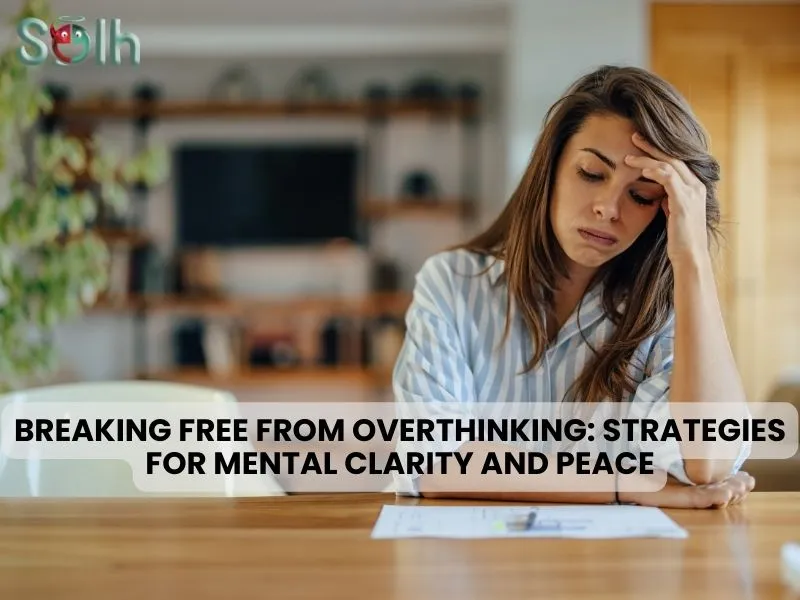The act of continually examining, revisiting, and ruminating over ideas, choices, or issues to an extreme degree, often without coming to an acceptable conclusion, is known as overthinking. When people are caught in a cycle of uncertainty and indecision, this mental loop can exacerbate worry and stress. Overthinking can impede productivity and paralyze decision-making since it frequently entails second-guessing past decisions, worrying about potential bad results, and projecting future scenarios. Overanalyzing exacerbates powerlessness and can have a detrimental effect on mental health and general well-being, rather than bringing about solutions.
Overthinking often exacerbates mental disorders and distress, creating a vicious cycle that can be challenging to break. This habitual rumination is commonly linked to conditions such as anxiety, depression, and obsessive-compulsive disorder (OCD), where persistent and repetitive thoughts dominate the mind. Individuals trapped in overthinking may experience heightened anxiety and stress, as their focus is continually pulled towards negative scenarios and potential problems.
This relentless mental engagement can drain emotional and cognitive resources, making it difficult to process emotions effectively and maintain a balanced perspective. As overthinking intensifies, it can lead to severe mental distress, impairing daily functioning and overall well-being. Effective management of overthinking often requires therapeutic interventions like cognitive-behavioral therapy (CBT) and mindfulness practices, which help individuals recognize and alter their detrimental thought patterns.
Additionally, lifestyle changes such as regular physical activity, adequate sleep, and healthy social interactions can support mental health. By addressing overthinking, individuals can break free from its paralyzing effects, reduce mental distress, and enhance their quality of life.
Are You Overthinking?
- The human mind knows that as time goes on, it cannot go back and make changes, but when you overthink, the human mind immediately begins to think about past events and tries different options for what could have been done. There is remorse for certain decisions, guilt for certain actions, and worry about doing things wrong.
- Trauma is another factor that can lead to overthinking. People who have experienced trauma are at a greater risk of becoming overly concerned. For example, childhood abuse or parental neglect can transform a person's brain to cling to a state of constant vigilance. Our response to the fighting, fleeing, or freezing in dangerous situations is very cautious. Thus, in such cases, traumatized individuals may experience uncontrollable thoughts.
Stress And Anxiety Are Common Responses Of Overthinking, Which Manifests As,
Triggering the Cycle: Stressful situations can initiate a cycle of overthinking. When faced with a stressful event, individuals may start over analyzing the situation, searching for solutions, or replaying events in their minds, which can further exacerbate stress levels.
Physical Symptoms: Chronic overthinking due to stress can manifest physically, leading to symptoms such as headaches, muscle tension, and fatigue. These physical symptoms, in turn, contribute to more stress, perpetuating the cycle.
Decision Paralysis: Overthinking often involves weighing every possible outcome, which can lead to decision paralysis. The inability to make decisions can cause additional stress, as unresolved problems continue to loom.
If you're prone to overthinking, try the following strategies when you find yourself slipping down the slope of rumination.
Accepting Or Rejecting Your Thoughts
Our brains are constantly buzzing with thoughts, but not all are helpful or accurate. Here's how to be more selective:
- Challenge Negative Thoughts: Don't just accept every critical thought as truth. Instead, question it. For example, if your mind tells you "I'm going to mess up this presentation," ask yourself, "Is there any evidence to support this? Have I messed up similar presentations before?" Often, you'll find the thought is based on fear, not reality.
- Focus on Facts: Instead of dwelling on worst-case scenarios, seek evidence. If you're worried about a fight with a friend, think about past conflicts. Did you resolve them? How? Focusing on facts can calm your mind.
Mental Retraining
Our brains crave stimulation; when left idle, they can wander into negative territory. Here's how to retrain them:
- Schedule "Thinking Time": Instead of trying to force negative thoughts away, set aside specific times to worry. This allows you to address concerns without them hijacking your day. During non-worrying times, actively engage in positive activities like reading or spending time with loved ones.
- Practice Mindfulness: Mindfulness meditation involves focusing on the present moment. This can be as simple as focusing on your breath or feeling your feet on the ground. By anchoring yourself in the present, you become less susceptible to overthinking.
Getting Grounded in Nature
- Nature has a surprising power to quiet the mind: Take a Walk in the Park: Studies show that spending time in nature can reduce rumination, the act of replaying negative thoughts. A brisk walk in a park or even a quiet sit on your balcony can make a difference.
- Appreciate Your Surroundings: Pay attention to nature's sights, sounds, and smells. Notice the vibrant colors of flowers, the chirping of birds, or the sun's warmth on your skin. Focusing on these sensory details can push away intrusive thoughts.

Journaling for Awareness
Keeping a journal can be a powerful tool for self-discovery:
- Track Your Thoughts: Write down the thoughts that bother you most often. This helps you identify patterns and triggers. Are your worries work-related? Social anxieties? Once you understand the themes, you can begin to address them.
- Challenge and Rewrite: After identifying negative thoughts, challenge them. Are they realistic? Are there more positive ways to look at the situation? Rewrite your negative thoughts in a more empowering light.
Overthinking can be a real drag, but the good news is there are steps you can take to break free from its cycle. By challenging negative thoughts, focusing on facts, and scheduling worry time, you can retrain your brain to be more helpful.
Mindfulness practices like meditation and time in nature can further ground you in the present moment, making it harder for overthinking to take hold. Finally, journaling allows you to track patterns, identify triggers, and rewrite negative thoughts into more empowering ones.
Remember, you don't have to be a prisoner of your mind. By incorporating these strategies into your daily life, you can take control of your thoughts and experience greater peace and clarity.
Here are some additional tips to keep in mind
Be Patient: Changing Thought Patterns Takes Time and Practice
Changing your thoughts is a gradual process requiring consistent effort and patience. Thought patterns, especially those ingrained over years, don't change overnight. Setting realistic expectations and understanding that setbacks are part of the journey is important. Practice mindfulness and self-awareness to catch yourself when you fall into old patterns. Celebrate small victories along the way, as each step forward is progress. By acknowledging this is a long-term process, you can maintain a more positive outlook and stay motivated.
Self-Compassion: Be Kind to Yourself
Overthinking is a common human experience, and it’s crucial to approach it with self-compassion. Instead of criticizing yourself for overthinking, recognize that it’s a natural response to stress or uncertainty. Treat yourself with the same kindness and understanding you would offer a friend. This means forgiving yourself for mistakes, acknowledging your efforts, and being patient with your progress. Self-compassion helps reduce the stress of overthinking and creates a supportive internal environment conducive to change.
Seek Support: Consider Talking to a Therapist
If managing overthinking becomes overwhelming, seeking professional help can be very beneficial. A therapist can offer a safe space to explore your thoughts and emotions without judgment. They can introduce evidence-based techniques such as cognitive-behavioral therapy (CBT) to help reframe negative thought patterns and develop healthier ways of thinking. Therapy can also provide tools for stress management, emotional regulation, and problem-solving, tailored to your specific needs. Remember, seeking help is a sign of strength, not weakness, and having professional guidance can significantly enhance your ability to cope with overthinking.
Changing thought patterns requires patience and practice. Self-compassion is key to dealing with overthinking kindly and constructively. If you struggle, seeking support from a therapist can provide you with additional tools and techniques to help manage and reduce overthinking. Each step contributes to a healthier, more balanced mental state, paving the way for long-term well-being.
Solh can help! We recognize the struggle. Solh is a supportive community with features like journaling for self-reflection, but we know you might need more. Connect with others in our anonymous support groups, share experiences, and find comfort in solidarity. Solh Buddy, your virtual companion, provides personalized encouragement along the way. We have a variety of tools because we believe in a unique approach to fighting burnout. Take charge of your well-being today. Explore Solh and reclaim your spark!



